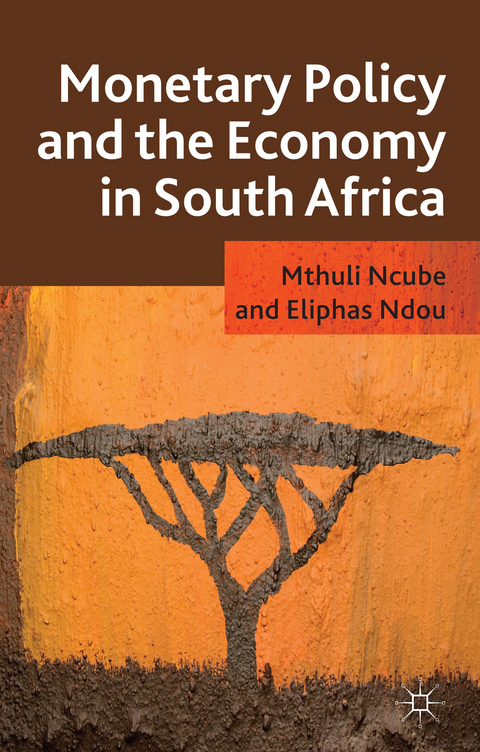
Monetary Policy and the Economy in South Africa
Palgrave Macmillan (Verlag)
978-1-137-33414-5 (ISBN)
Monetary Policy and the Economy in South Africa covers both modern theories and empirical analysis, linking monetary policy with relating house wealth, drivers of current account based on asset approach, expenditure switching and income absorption effects of monetary policy on trade balance, effects of inflation uncertainty on output growth and international spill overs. Each chapter uses data and relevant methodology to answer empirical and pertinent policy questions in South Africa. The book gives new insights into understanding these areas of economic policy and the wider emerging-markets.
Professor Mthuli Ncube is Chief Economist and Vice President at the African Development Bank Group. He researches and has published widely in various areas of economics and finance in Africa and globally. He is a tenured Professor and was Dean of the Graduate School of Business Administration, and of Faculty of Commerce, Law and Management, University of Witwatersrand. He has extensive corporate experience as an investment banker with Investec and Barbican, and Board member of the South African Financial services Board, a regulator. Eliphas Ndou works at the South Africa Reserve Bank Research Department as an economist in the monetary policy research unit. He lectures international finance and microeconomics at the University of Witwatersrand, South Africa.
Contents 1. South African Monetary Policy Regimes 2. Effects of Monetary Policy on Output 2.1. Introduction 2.1.1. Theory and Past Empirical Evidence 2.2. VAR Methodology 2.3. Data 2.3.1. How do Variables React upon Impact? 2.5. Empirical Results 2.4.1. Examining the Relationship between Estimated Policy Shocks and Recessions 2.5. Conclusion 3. Inflation Uncertainty and Output 3.1. Introduction 3.2. Theory 3.2.1. The Friedman Hypothesis 3.2.2. The Impact of Inflation Uncertainty on Inflation 3.2.3. Inflation Uncertainty, Real Output Growth, and Output Growth Uncertainty 3.3. Literature Review 3.4. Econometric Methodology 3.4.1. The Relationship between Inflation and Inflation Uncertainty 3.4.2. The Inflation Uncertainty and Real Output Growth 3.5. Data and Descriptive Statistics 3.6. Empirical Results 3.6.1. VAR Methodology 3.7. Conclusions 4. Monetary Policy Transmission, House Price and Consumption 4.1. Introduction 4.2. Consumption, Housing Prices and Interest Rates 4.2.1. The Effect of Monetary Policy on House Prices 4.2.2. The Effects of House Prices on Consumption 4.3. The VAR Model 4.4. Data 4.5. Results and Discussion 4.5.1. Forecast Error Variance Decomposition 4.5.2. Robustness Analysis 4.5.3. Discussion of Consumption Declines Results 2.5. Conclusion Appendix: Quantifying Declines in Consumption Unit Root Tests 5. Monetary Policy, Disposable Income and Consumption 5.1. Introduction 5.2. Data 5.3. VAR Model 5.4. Results 66 5.5. Impact of Oil Price in the Extended Model 5.6. Counterfactual Analysis 5.7. Variance Decompositions 5.8. Conclusions 6. Mortgage Variables, Monetary Policy and Consumption 6.1. Introduction 6.2. Theory 6.3. What does International Evidence Conclude? 6.3. Data 6.4.1. Bayesian VAR Approach 6.5. Results 6.5.1. Contractionary Monetary Policy Shock 6.5.2. Mortgage Lending Rate or (Negative Credit Supply) Shock 6.5.3. Housing Demand Shock 6.5.4. Residential Investment Shock 6.5.5. Variance Decompositions 6.6. Examining Impact of USMortgage Variables on South Africa 6.6.3. Variance Decomposition 6.7. Conclusion 7. Monetary Policy and Exchange Rate Shocks on South Africa Trade Balance 7.1. Introduction 7.2. Literature Review 7.3. VAR Methodology 7.3.1. Benchmark VAR Model 7.4. Data 7.5. Empirical Results 7.5.1. How are Policy Shocks Transmitted into Trade Balance? 7.6. Variance Decomposition 7.7. Conclusion 8. Exchange Rate, House Prices and Equity Shocks on Current Account 8.1. Introduction 8.2. Review of Findings in Other Countries 8.3. VAR Methodology 8.4. Data 8.5. Empirical Results 8.5.2. Forecast Error Variance Decompositions 8.6. Conclusion 9. International Transmission of US Shocks into South Africa 9.1. Introduction 9.2. A Review of Previous Empirical Analysis 9.3. VAR Methodology 9.4. Data 9.5. Results 9.6. Conclusion References
| Erscheint lt. Verlag | 30.8.2013 |
|---|---|
| Zusatzinfo | XV, 194 p. |
| Verlagsort | Basingstoke |
| Sprache | englisch |
| Maße | 140 x 216 mm |
| Themenwelt | Sozialwissenschaften ► Soziologie ► Spezielle Soziologien |
| Wirtschaft ► Betriebswirtschaft / Management | |
| Wirtschaft ► Volkswirtschaftslehre ► Finanzwissenschaft | |
| Wirtschaft ► Volkswirtschaftslehre ► Makroökonomie | |
| Wirtschaft ► Volkswirtschaftslehre ► Wirtschaftspolitik | |
| ISBN-10 | 1-137-33414-2 / 1137334142 |
| ISBN-13 | 978-1-137-33414-5 / 9781137334145 |
| Zustand | Neuware |
| Haben Sie eine Frage zum Produkt? |
aus dem Bereich


